ASTRO 2022 Highlights: Merging of Science and Spirit
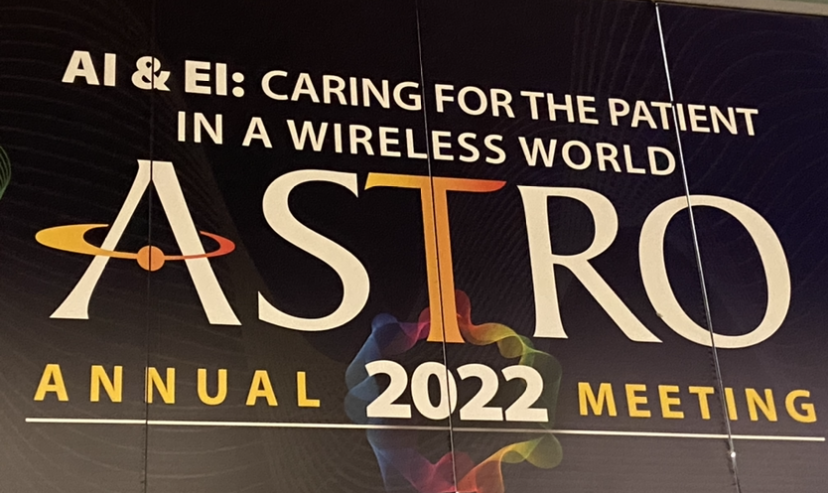
The 64th American Society for Radiation Oncology (ASTRO) Annual Meeting theme, Artificial Intelligence (AI) and Emotional Intelligence (EI): Caring for the Patient in a Wireless World, was woven through various symposia, addresses, and sessions at the Henry B. Gonzalez Convention Center in San Antonio from October 23-26. For a field known for its technological innovation and integration, meeting planners prioritized coverage both of radiation therapy advances and the human side of care that encapsulates whole-patient treatment and maintaining trusting relationships.
“While the big stories focused on ongoing technological innovation, people are really influenced by the way we communicate and the tools we use to approach patient interactions,” says Geraldine Jacobson, MD, MBA, MPH, FASTRO, chair of the ASTRO Board of Directors, former ASTRO president, and radiation oncologist at Premier Radiation Oncology Associates in Clearwater, FL. “I’m all in favor of technological innovation – that’s an area that our specialty does so well – but we don’t want to lose our human qualities that are really an important part of taking care of our patients. The meeting really balanced this.”
Key Talks
Dr. Jacobson selected keynote speakers to reflect the broad array of topics that would be presented at the meeting, addressing today’s rapidly changing health care environment. On Monday October 24, Ruha Benjamin, PhD, professor in the department of African American Studies and director of graduate affairs at Princeton University, presented “Race to the Future? Reimagining the Default Settings of Technology and Society,” addressing the social dimensions of data science, discriminatory design in technology, and how digital tools can replicate existing hierarchies and propagate racist policies.
“[Dr. Benjamin’s] talk addressed how technology and AI can be used in different ways. These are not ‘value-neutral’ since the biases of people who design them make their way into society,” Dr. Jacobson says. “Historically, there are racial biases in health care, so we have to be alert to them and, when we see them, work to dismantle them.”
In the same vein, Everett Vokes, MD, from the American Society of Clinical Oncology (ASCO) presented important findings from ASCO’s annual meeting including equity in treatment and scientific innovation. Also in that session, Martha Matuszak, PhD, from the American Association of Physicists in Medicine (AAPM), presented on incorporating medical physics more closely into patient care, explainable machine learning (ML), and personalized dosimetry.
In Tuesday’s keynote, Richard Deming, MD, medical director at MercyOne Richard Deming Cancer Center in Des Moines, IA, presented, “Above and Beyond Cancer: Optimal Living in Survivorship,” sharing stories of life-changing mind-body-spirit adventures to Everest basecamp and discussing the journey of cancer survivorship. He also discussed the importance of compassionate listening and the power of radiation oncologists to heal, guide, and be present. “Not every patient can be cured, but every patient can be healed,” says Dr. Deming, whose public charity takes cancer survivors on international adventures.
“Whether you’re a cancer patient or an ongoing survivor, the message [of the keynote] is that it’s one step at a time, finding joy in everyday life,” Dr. Jacobson adds. “It highlighted the importance of the human spirit and how tapping into that can improve people’s lives.”
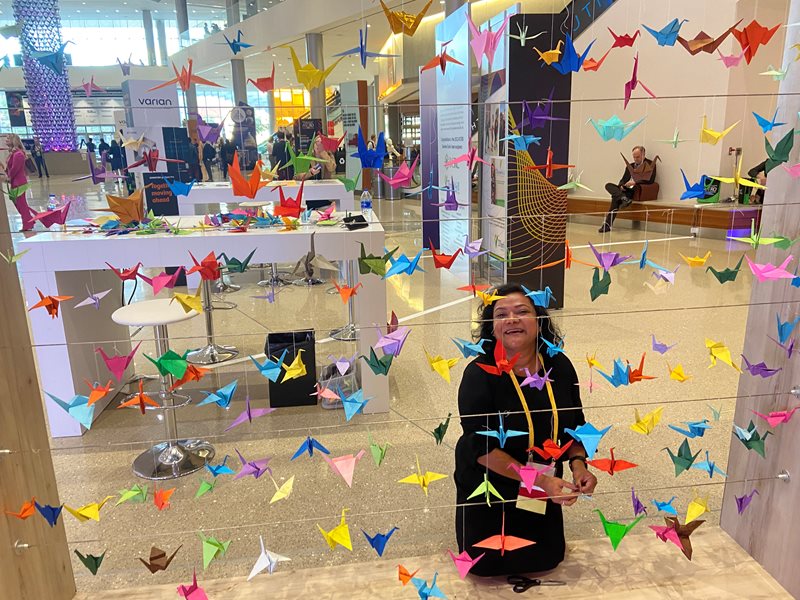 To provide added support services for people with cancer, ASTRO issued grants to 2 San Antonio-based nonprofit organizations: Breast Cancer Resource Center and ThriveWell Cancer Foundation. Attendees also folded hundreds of colorful origami cranes to represent the comfort and healing of cancer patients at the Survivor Circle booth.
To provide added support services for people with cancer, ASTRO issued grants to 2 San Antonio-based nonprofit organizations: Breast Cancer Resource Center and ThriveWell Cancer Foundation. Attendees also folded hundreds of colorful origami cranes to represent the comfort and healing of cancer patients at the Survivor Circle booth.
Additionally, the 4-hour Presidential Symposium highlighted the meeting theme of AI, delving into diagnostics, prediction, treatment planning, dosimetry and physics, the prevention and mitigation of radiation toxicity, and how future AI applications will transform radiation oncology. The final segment of the symposium, “Human Doctors, Human Patients,” and Monday’s presidential address, “AI and EI: Shaping the Future of Radiation Oncology,” both presented by Dr. Jacobson, explored emotional intelligence topics, including doctor-patient communication, digital empathy, cognitive biases, the role of hope, and long-term quality of life. She also discussed radiation oncology’s potential in impacting health policy and creating a more sustainable world.
“The best way to predict the future is to create it,” she says. “I hope that we’ll use our human skills and our amazing technology to create a positive future for our society, our patients, and the world we live in.”
AI and EI continued to emerge throughout a diverse line-up of sessions. “There was a noticeable connection between how AI can be used and the importance of realizing that the doctor-patient relationship is a human connection,” she says.
Speaker Diversity and Added Opportunities
Meeting planners worked to include speakers representing the ASTRO membership and population, Dr. Jacobson adds. “We wanted diversity of age, gender, ethnicity, geography, and practice type. We really tried to have a very diverse group of speakers, and that came through in the energy of the meeting,” she says.
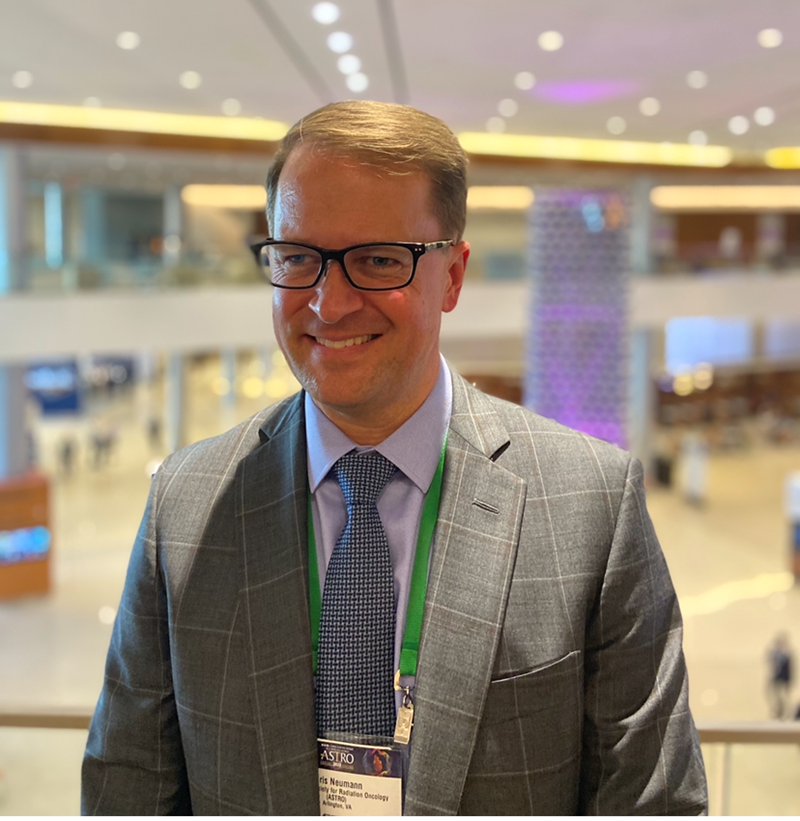 “The idea is that coming to the meeting isn’t just about the education and the science; it’s about an experience,” adds Chris Neumann (pictured left), vice president of education at ASTRO. “We were really excited about experiencing a ‘normal’ meeting again and enjoying each other’s company.”
“The idea is that coming to the meeting isn’t just about the education and the science; it’s about an experience,” adds Chris Neumann (pictured left), vice president of education at ASTRO. “We were really excited about experiencing a ‘normal’ meeting again and enjoying each other’s company.”
Toward this end, ASTRO held its first Speed Mentoring event, where radiation oncology leaders hosted tables to discuss assigned topics as mentees rotated through. Participants shared short, focused, productive career chats on subjects such as private practice, development, leadership, and advocacy, to help build networks and foster inspiration. Also new this year was the Game Zone, housed in the exhibit hall, where attendees could relax with a round of cornhole, Connect Four, shuffleboard, Operation, and a host of other games and brain break opportunities.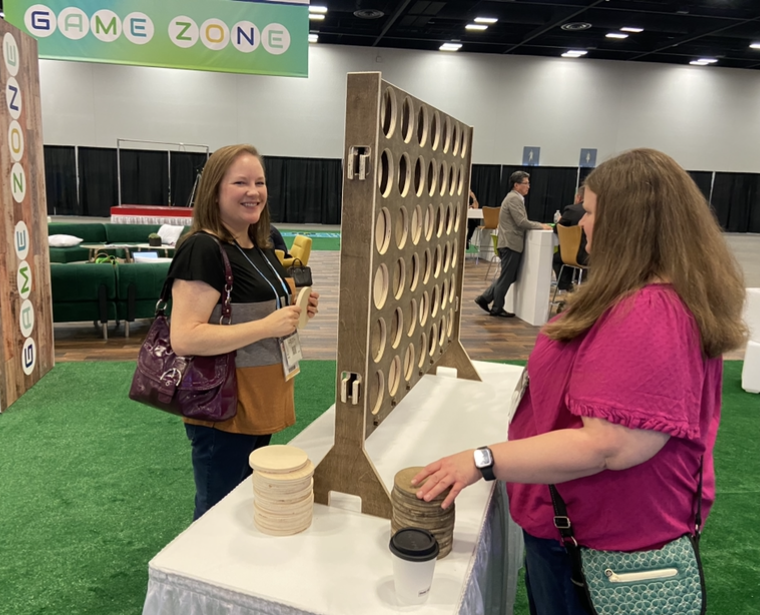
Another noteworthy event was the “Help Ukraine!” presentation, where speakers detailed the impact of the Russian occupation and how the radiation oncology community can support Ukrainian cancer patients and the country at large. Ruslan Zelinskyi, MS, president of the Ukrainian Association of Medical Physicists, notes, “I often hear that science is outside politics. Perhaps, in peace time. When fragments of missiles pass through the wall …of your workplace, it’s impossible to be outside politics, outside of war.”
Roman Kowalchuk, MD, radiation oncology resident at Mayo Clinic in Rochester, MN, reminded attendees, “We have so much to offer even if we can’t be there physically,” referring to telemedicine in particular. He also discussed apps such as HealUA through which Ukrainian doctors can receive help from colleagues worldwide. Presenters Dr. Kowalchuk and Nataliya Kovalchuk, PhD, clinical associate professor in the department of radiation oncology at Stanford University School of Medicine, recently published an article that further details the struggles in Ukraine.
Plenary Session Key Points
A perennial favorite at the ASTRO annual meeting is the Plenary Session, highlights of which include:
- NRG RTOG 1005: A Phase III Trial of Hypo Fractionated Whole Breast Irradiation with Concurrent Boost vs. Conventional Whole Breast Irradiation Plus Sequential Boost Following Lumpectomy for High Risk Early-Stage Breast Cancer, presented by Frank Vicini, MD, FASTRO, and discussed by Lori Pierce, MD, FASCO, FASTRO: Randomized trials support a supplemental radiation dose to the lumpectomy cavity region after WBI. A concurrent boost with hypofractionated WBI should be incorporated into treatment options for early stage breast cancer, says Dr. Pierce. She also stressed the importance of actively and equitably recruiting minority patients so that all cancer patients have equal access to high-quality cancer care.
- NRG/RTOG 1112: Randomized Phase III Study of Sorafenib vs. Stereotactic Body Radiation Therapy (SBRT) Followed by Sorafenib in Hepatocellular Carcinoma (HCC), presented by Laura Ann Dawson, MD, FASTRO, and discussed by Mary Feng, MD: In patients with advanced HCC, compared with sorafenib alone, SBRT prior to sorafenib improved overall survival, progression-free survival, and time to progression, with no concerning increase in adverse events; it should be the new standard of care. Next on the horizon for HCC is testing the interplay of radiation therapy and immunotherapy, says Dr. Feng.
- Radiotherapy with Durvalumab vs. Cetuximab in Patients with Locoregionally Advanced Head and Neck Cancer and a Contraindication to Cisplatin: Phase II Results of NRG-HN004, presented by Loren K. Mell, MD, discussed by Sana Karam, MD, PhD: Durvalumab did not show a signal toward improved PFS compared to cetuximab and led to significantly worse locoregional failure. “While this trial did not meet its primary aim, the results are crucial in establishing the feasibility of accrual of a trial of this size, for this unique population, using the specific eligibility criteria that were established for the first time,” Dr. Mell says. Dr. Karam adds, “Are we overriding the immune checkpoint blockade?” noting the answer in literature suggests “less may be more” considering that effects of chronic inflammation can backfire.
- Durvalumab in Combination With Chemoradiotherapy (CRT) in Locally Advanced Cervical Cancer (LACC): Radiotherapy (RT) Delivery and Subgroup Analyses from CALLA,” presented by Jyoti S. Mayadev, MD, discussed by Stephanie Markovina, MD, PhD: The 12-month progression-free survival rate was 76.% for patients receiving the immune checkpoint inhibitor Durvalumab with CRT, and 73.3% for the placebo. The 24-month PFS rate was 65.9% in the durvalumab arm and 62.1% for placebo. It was the first global, placebo-controlled phase 3 study evaluating Durvalumab, including 120 sites in 15 countries. “The CALLA trial really sets a new benchmark for clinical trials for patients with locally advanced cervical cancer,” says Mayadev.
Payment Policy and Economics
Addressing concerns about the workforce supply-demand imbalance and the potential impact of the CMS alternative payment model (APM) on reimbursement and practice patterns, Alexandra De Leo, MD, a radiation oncology resident at the University of Florida, presented the session, “Trends in American Radiation Oncology Workforce, Patient Volume and Technology Utilization.” Using publicly available data from 2012-2019, she charted the number of radiation oncology providers per year, ratios of new patients per provider, on-treatment visits, fractions per year based on modality type, among other metrics. Trends showed an 11.5% increase in providers between these years, and a 17% increase in the number of new patient visits. While intensity-modulated radiation therapy (IMRT) and 3-D conformal therapy represented the majority of fractions delivered per year, the use of advanced treatment technologies went up by a 300% increase in proton fractions and a 182% increase in SBRT and SRS fractions.
“The stable ratio of new patient visits to radiation oncology providers suggests that…growth in patient volume resembles growth in radiation oncologists; however, there has been an uncoupling of increase in net present values (NPVs) and treatment plans that may reflect increased omission of RT in situations where RT was previously utilized. Radiation oncology reimbursement declined before the introduction of the Radiation Oncology Alternative Payment Model (RO-APM),” says Dr. De Leo. She notes that with any new payment model, trends in providership and technology utilization should be closely monitored, as should their impact on practice patterns and patient care.
On-Demand Access and Future Plans
For the first time, meeting planners offered in-person, virtual, and on-demand attendance options, streaming the entire meeting and making available 180-plus hours of AMA PRA Category 1 CME credit until June 1, 2023. Thousands of people have already taken advantage of on-demand opportunities, says Neumann.
“Education is an access issue. We do have these amazing, in-person meetings, but we know that not everyone can come,” says Neumann. “Even if you’re here, you may be networking and stretched thin, so you can always go back and check out sessions you missed.”
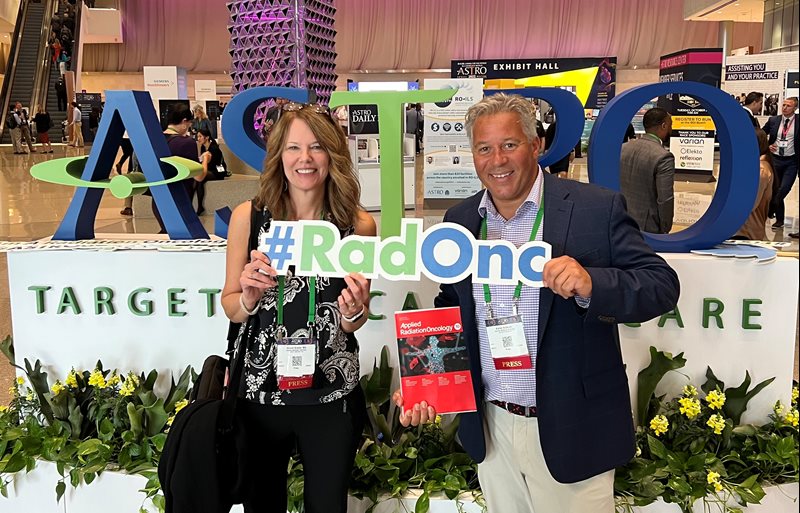
For additional ASTRO 2022 highlights of clinical trials and exhibit hall news, please visit Vendor Updates and Industry News at https://appliedradiationoncology.com/.